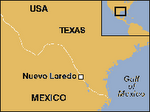By Frank Levine
InterPress News Service
BULLETIN --U.S. and Mexican intelligence officials are searching for at least 300 Arab extremists reported missing earlier this year from North Africa, after eluding surveillance by local and international intelligence agencies.
Many of the missing "potential terrorists," according to the officials, are Spanish-speaking Moroccans, previously surveilled by both Spanish and Moroccan intelligence agencies following the March 11, 2004 attacks on the Madrid rail system that killed 190 and injured and estimated 2,000.
"They seemingly vanished into thin air about the same time," observed one U.S. source. "It would be an understatement to say we are not concerned that some may find their way to Central America and Mexico, blend in with the local population, learn some of the expressions and customs, then infiltrate in the U.S."
The escape of the jihadists has reportedly angered some U.S. and European intelligence officials, who are undiplomatic in blaming Moroccan agencies for their apparent "looking away" while the jihadists absconded.
Officially, the Department of Homeland Security, the FBI and other U.S. government agencies will neither confirm nor deny the reports.
"It was just too easy," the U.S. source said. "People simply can't disappear like that from under surveillance without someone noticing something was up."
The report coincides with another of a massive FBI hunt this week for 11 missing Egyptian students in the United States; however, preliminary interrogation reports indicate that none was involved with "terroristic activities."
Meanwhile, there have been unconfirmed reports that a small number of the North African jihadists have already been detained in Guatemala, El Salvador, Honduras and Mexico.
Their current whereabouts, however, remain unknown.
Of great concern is their ability to utilize their language abilities and training to move through Spanish-speaking countries relatively unnoticed.
"U.S. Border Patrol agents are now being forced to take a good hard look at even the most mundane immigration arrest, as the North Africans can pretend to be of Mexican or Central American origin, especially if they stay in a country for a few months to learn some of the local expressions and accents," the source said, adding: "Therefore, the immigration authorities throughout the region must ask probing questions, far beyond the standard questions of name and country of origin."
The post Madrid bombings investigation by Spanish authorities, supported by the combined resources of U.S., French, German, Israeli and other international agencies, including INTERPOL, indicated that some of the Madrid bombing conspirators were directly linked to some of the alleged jihadists in Morocco.
The massive multi-national investigation reportedly tagged 300 and 600 individuals to be kept under moderate to tight surveillance in the aftermath of the Madrid attacks, but by June, 2005, most of those being watched had seemingly vanished, according to confidential intelligence sources.
Meanwhile, as a result of a recent series of secret intelligence meetings between Mexico, El Salvador, Guatemala and the United States, the exchange of information on the movement of suspected jihadists and other potential "terrorist threats" in the region has been increased to unprecedented levels. U.S. "advisers" have been strategically placed at key transportation hubs throughout the region, including airports, train and bus stations.
In a separate development, it has been reported that U.S. Special Operations Forces and heavily armed civilian intelligence elements have been sighted throughout the region, including the South American countries of Paraguay and Uruguay.
Tuesday, August 08, 2006
Intelligence agencies tracking Spanish-speaking Jihadists in Mexico, Central America
Posted by
Frank Levine
at
23:37
0
comments
![]()
Labels: border, intelligence, jihadists, mexico, moroccan, spanish, threats
Subscribe to:
Comments (Atom)





